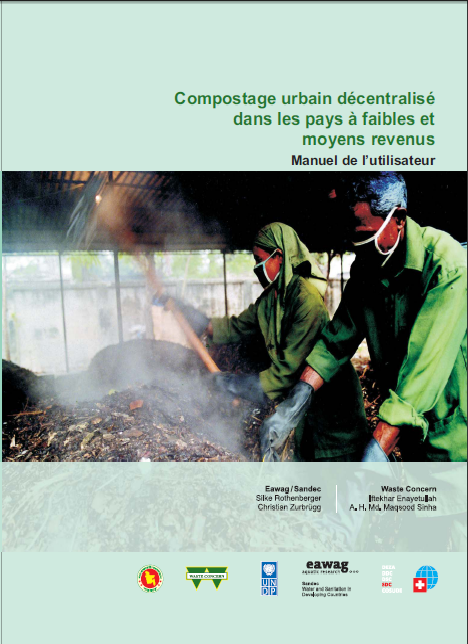Decentralised urban composting in middle and low income countries - User's manual (in English and French)
S. Rothenberger, C. Zurbrügg, M. Sinha, I. Enayetullah (2006)

Published in: 2006
Publisher:
Eawag-Sandec and Waste concern, Switzerland, ISBN 978-3-906484-36-5
Author:
S. Rothenberger, C. Zurbrügg, M. Sinha, I. Enayetullah
Uploaded by:
SuSanA secretariat
Partner profile:
common upload
5109 Views
28 Downloads
Content - Summary
This book describes approaches and methods of composting on neighbourhood level in small-and middle-scale plants. It considers issues of waste collection, composting technologies, management systems, occupational health concerns, product quality, marketing and end-user demands. The reader is led step by step through the planning, implementing and operational stages of a decentralised composting scheme.
Also available in French:
Compostage urbain décentralisé dans les pays à faibles et moyens revenus. Manuel de l'utilisateur
Enayetullah, I., Zurbrügg, C., Rotenberg, S., Maqsood, A.
Le présent manuel donne de manière progressive des directives sur la manière d’initier un projet de compostage décentralisé dans un pays en développement.Dans les pays en développement, les déchets solides se composent surtout de matières organiques biodégradables et lorsque les
déchets organiques ne sont pas ramassés, il se pose trois problèmes environnementaux majeurs d’abord, la pollution de la nappe phréatique et de l’eau de surface par les lixiviats ; ensuite la propagation des vecteurs de maladies à partir des déchets laissés à ciel ouvert sur les décharges brutes et enfin, le méthane qui est un des principaux gaz à effet de serre dont l’émission dépend de la condition anaérobie dans les décharges. Afin d’éviter toute agression causée par les déchets solides sur l’environnement, il convient de promouvoir l’utilisation du compost.
L’une des approches durables est de considérer les déchets comme une ressource et non comme un problème. Ce manuel démontre qu’il est possible de faire des déchets une source pourvoyeuse d’emplois et d’opportunités pour les pauvres et un facteur d’amélioration de la sécurité alimentaire.
+++++++++++
A Hindi version is also available, see external link below
Bibliographic information
S. Rothenberger, C. Zurbrügg, M. Sinha, I. Enayetullah (2006). Decentralised urban composting in middle and low income countries - User's manual (in English and French). Eawag-Sandec and Waste concern, Switzerland, ISBN 978-3-906484-36-5
Filter tags
Composting, vermicomposting (solid waste), composting toilets English Europe & Central Asia French Guidelines and manuals Peri-urban Urban (entire city)
Further readings
Eawag-Sandec website where this publication can be downloaded in different languages and resolutions














